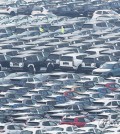- California Assembly OKs highest minimum wage in nation
- S. Korea unveils first graphic cigarette warnings
- US joins with South Korea, Japan in bid to deter North Korea
- LPGA golfer Chun In-gee finally back in action
- S. Korea won’t be top seed in final World Cup qualification round
- US men’s soccer misses 2nd straight Olympics
- US back on track in qualifying with 4-0 win over Guatemala
- High-intensity workout injuries spawn cottage industry
- CDC expands range of Zika mosquitoes into parts of Northeast
- Who knew? ‘The Walking Dead’ is helping families connect
Traffic heavy on highways on final day of extended Lunar New Year holiday
Traffic on major highways built up nationwide Thursday, as millions of South Koreans returned home on the final day of the extended six-day Lunar New Year holiday.
On some sections of the Gyeongbu Expressway, which links Seoul to the southeastern city of Busan through major cities, cars were often at a standstill as of Thursday morning due to heavy traffic.
According to the state-run Korea Expressway Corp., a drive from the southeastern port city of Busan to Seoul, 320 kilometers in distance, was expected to take about seven hours and 40 minutes as of 9 a.m.
From Gwangju, 267 km south of the capital, the drive was expected to take five hours.
Korea Expressway said traffic toward Seoul was expected to ease around 3-4 a.m. the next day.
From Seoul to Busan, the drive was to take seven hours and 10 minutes. It would take five hours and 10 minutes from the capital city to Gwangju.
Traffic congestion on outbound routes from Seoul is expected to ease between 11 p.m. and midnight, according to the company.
An estimated 5.25 million cars were projected to travel on highways nationwide in both directions to and from the broader capital region in the day, the agency said.









![배우 김민희와 홍상수 감독[스타뉴스]](http://www.koreatimesus.com/wp-content/uploads/2025/04/20250408101705671-120x134.jpg)

